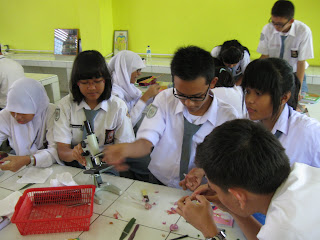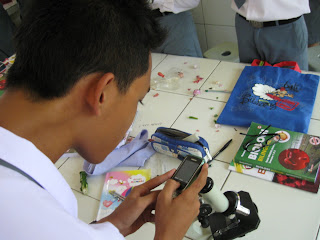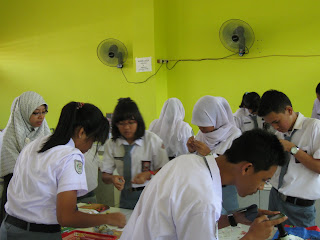 |
| With SMA 3 teachers at the workshop. Mr. Zulfiki, my co-presenter is to the right of me. Mr. Wahyudi, IT expert and my internet hero, is to the left of me. Zulfah is on the far left. |
 |
| Presenting some information about PBL and answering many questions. |
 |
| Ms. Dessy in the biology lab preparing her students for their hands-on, collaborative study of cells. |
 |
| Students trying to get the perfect slice of shallot, while also working to set up their microscope. Five students to one non-electronic microscope...and it works! |
 |
| Preparing the slide. |
 |
| These kids are ingenious...they used their cell phones to create light that was refracted by a small mirror, allowing them to see the cells on their slide. |
 |
| Check out how clear that image is - taken on a simple Blackberry through the viewer of a microscope with no light other than the natural light coming into the classroom and some light from another cell phone. It was amazing to me. Never would have dreamed this was possible back when I was in high school studying biology! |
 |
| High-tech scientists in a low-tech lab! |
 |
| Can you believe it? Such a large class, so few resources, and they managed to stay on task and cooperate for 90 minutes... |
 |
| And there is no air-conditioning in these classrooms, I should mention...but they are not complaining and are actively engaged! Hats off to both the students and teachers here for their strength, endurance, dedication, and perseverance. |
Today will be the second part of my two part workshop on Project-Based Learning. This is actually one of the chief reasons the U.S. Dept of State sent me to Sumatra - to share teaching methodologies and experiences from the U.S. classroom with colleagues overseas. Last week, we had a really interesting and rather lively (engaged) session learning about PBL in general and today, I hope, we will discuss ideas for projects and work on designing some projects that teachers can employ here in SMA 3.
There are always surprises when working with technology and when doing workshops generally, aren't there? And last week was no exception. First, it was decided that there would be two workshops combined into one: Mr. Zulfiki, an awesome math teacher here, needed to present on curriculum mapping and new guidelines and instructions from an Indonesian teachers conference he had just attended and I was to present on PBL. This actually worked out perfectly as he spent some time talking about Bloom's Taxonomy, affective needs of students, and 21st Century skills (such as leadership, tolerance, etc.). In many ways, his intro was a nice lead in to what I presented and we found much overlap in what we were presenting as the workshop continued. I think he was quite pleased to have me sharing PBL at that time actually - it gave some meat and credibility (they do this in the U.S. too) to what he was telling teachers they were now required to consider and do here in Indonesia.
The second surprise was less welcome and easy to work around, though we made do. There was a power outage on the day of the workshop and so I was without my PowerPoint, without video examples of PBL in action, without web resources...but I did have translation support (much needed as half the teachers at the workshop were not English teachers) and the positive energy and support of the very friendly staff here. It was a very hot afternoon and it was the first week of school and everyone was exhausted, but we actually got rather wrapped up in the session and the discussion and went until 5pm (having started at 2pm with Mr. Zulfiki's presentation). What was very interesting to me was that both the excitement and the resistance to what I was presenting matched what I experience when I talk with teachers in the U.S. Some teachers were so thankful and one said to me very sincerely after: "I hope one day we will have this type of instruction at our school and in all of Indonesia." On the other hand, there were the same questions and reservations (legitimate questions I should say and true problems that have to be solved and worked around, but not true obstacles for one who is willing to try and do the required work): "How big are your classes?" "Do you have computers for your students?" "How do you get money for the projects?" "What about state exams? I have to prepare students for the exams." and so on... It was absolutely fascinating to me that the same concerns arose...and that the same fears surfaced: of having to do more work, of having to let go of some control in the classroom, of trusting that students will perform well on exams if they are actually learning at a higher - or deeper - level (on Bloom's Taxonomy), of opening their classroom and their teaching to the community - to partnerships and outside eyes and potential critiques, of not knowing everything about the content and feeling a lack of confidence in leading a project that might develop questions that the teacher can not easily answer, of students not being fully prepared for university or careers or...and so on...
All in all, though, it was a really positive exchange of ideas...and I'm very interested to see what thoughts and potential project plans teachers may bring to the discussion today. I'm hopeful we'll have power so that I can show some examples and resources online.
There is so much potential here, in terms of implementing PBL, and there are even some necessary pieces already in place. For example, some teachers are already giving it a try and are willing to serve as mentors - such as Zulfah who has done a literature study project with her students and is taking on a project to make a news program with some classes this semester after talking with me briefly about some ideas last week. Also, students are already skilled collaborators. Due to the social nature of Indonesian culture (people are rarely alone and enjoy each others company) and to the lack of resources (for example a class of 40+ students had only 7 microscopes to use in a biology class I visited), students are used to working together and do so quite well. I was so impressed with Ms. Dessy's biology class and their study of cell structure. They were all engaged (honestly) and working together to achieve the best in their studies. Also, I should say, that despite the limited technology and problems with band width and so on, teachers and students alike make effective use of the technology that is available. In Dessy's biology class, students used their cell phones to capture images of cells through the microscope...it was genius.
All this is to say, that I love what I do (PBL being one piece of my work) and am so happy to be able to share it with other teachers and to also learn from them how to do it better!









